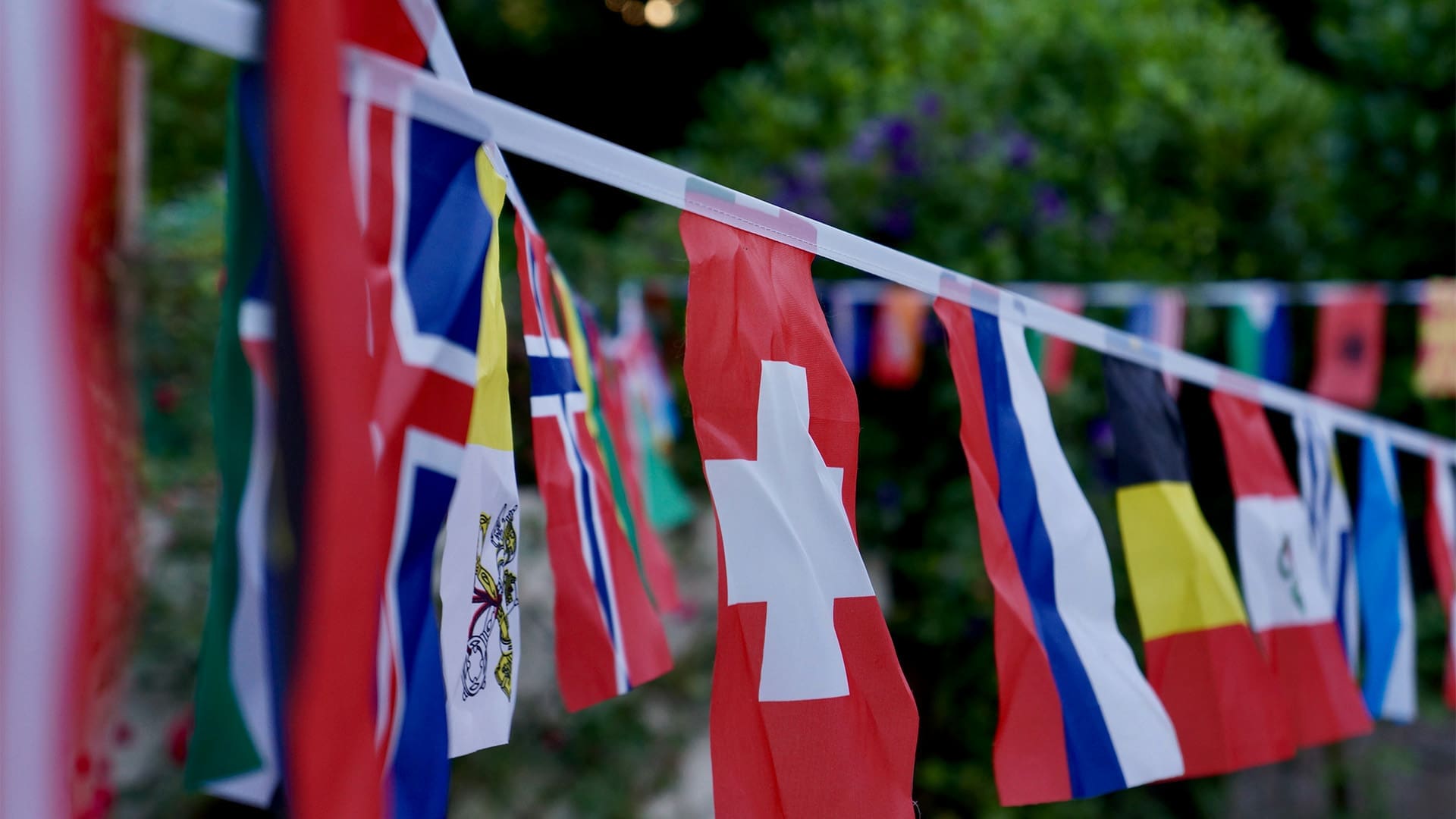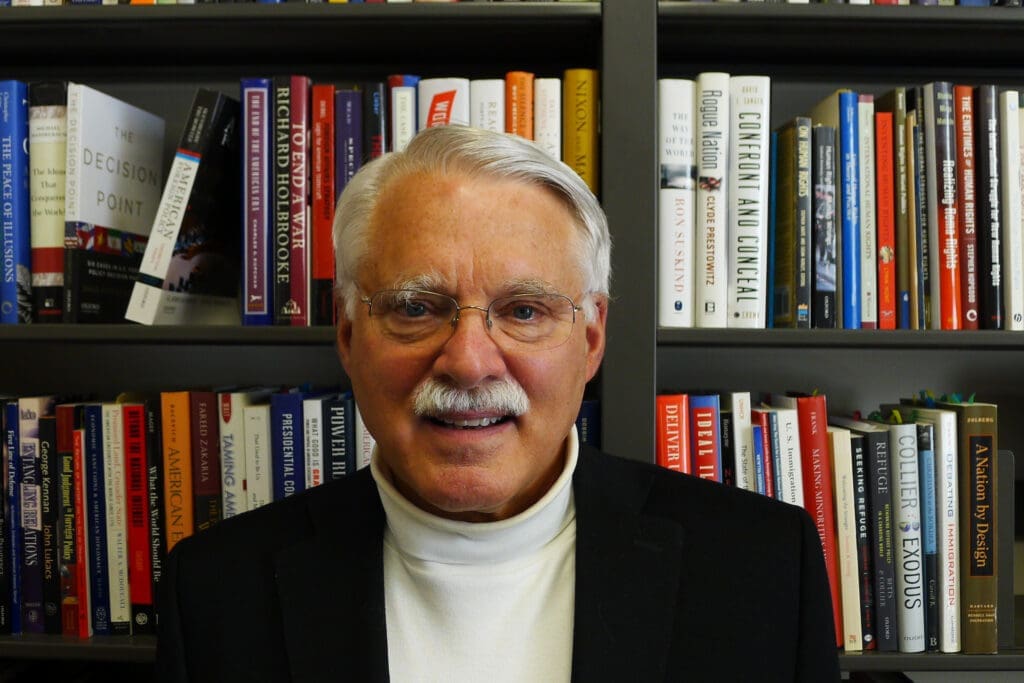I
In its opening months, the Trump administration has displayed a startling willingness to tear down long-standing domestic institutions and international commitments. To some, this signals a cathartic correction of elite overreach; to others, a reckless dismantling of the very architecture that upholds the common good. Institutions, of course, are not immune to critique. But the way they are challenged—and what is offered in their place—will have consequences long after any of us currently living are gone.
The moment invites a longer view. In the years following the Soviet Union’s collapse, Western democracies entered a season of joyful confidence: liberal institutions expanded, markets integrated, and a rules-based international order seemed within reach. But the story did not hold. In recent decades, the world has become more fragmented and polarized. Autocracies have gained ground, global inequalities have deepened, and the values that once anchored democratic life have grown unsteady.
In such a time, the need for reflection—moral, civic, and theological—is acute. What is the nature and purpose of the nation-state today? What kind of global order can genuinely uphold human dignity and peace? And what role might Christians play in renewing both?
The Role of States
The principal political actor in the international community is the nation-state. According to the UN Charter, the world comprises sovereign states that are independent and juridically equal. While political leaders and policy-makers tend to accept the global society of states, progressive thinkers and religious leaders believe that the world is best conceived as a coherent global society—an international community—where transnational bonds take precedence over citizenship in nation-states.
The nation-state is important because it provides a foundation for membership in an established political community. People need a political home—a structure that provides the common life necessary for human flourishing. Although belonging can also be found in families, churches, and civic groups, the nation-state is the foundational political community in the world because it alone has the ability, based on communal solidarity and state power, to make and enforce society-wide decisions and to pursue effective international cooperation. Moreover, individual rights can only be secured with a humane, benevolent state. Without a state, there can be no order, and without political order, the securing of rights is impossible.
People living in stable and prosperous societies often take for granted the role of the state in providing order and protecting human rights. Since modern democratic states provide ample security and welfare to most citizens, it is commonly assumed that order and prosperity are natural by-products of communal life. But beneficent states do not arise by default. They are built—deliberately, painstakingly—through historical struggle and the slow forging of civic covenant.
An effective nation-state fulfills both domestic and international responsibilities: ensuring the safety and prosperity of its citizens, respecting the sovereignty of other states, pursuing peaceful conflict resolution, and contributing to shared global concerns. Given the many fragile and failing states around the world, a pressing question arises: Should the current order of nation-states be abandoned in favour of an alternative model—such as global federalism, in which a central international regime governs semi-sovereign states, or a form of imperial governance resembling a diluted world government? Or is the more prudent path to invest in strengthening vulnerable states and pursuing reforms that reinforce the rule of law?
Here, a distinction is vital. State-building refers to the development of governmental institutions: the bureaucracy, the judiciary, the mechanisms of law and administration. Nation-building, by contrast, is the cultural and relational work of forging a people bound by language, history, economic activities, and a shared story. While state-building is primarily an internal effort, foreign states can contribute to this task by building infrastructure, strengthening bureaucracy, and aiding governmental institutions.
Nation-building occurs when cultural and institutional changes result in increased social capital—that is, trust and accountability. Michael Novak, in The Spirit of Democratic Capitalism, observes that an effective democratic state rests on three interdependent systems: a moral-cultural framework, an economic system, and a political order. Crucially, he argues that effective economic and political institutions can only function if they are built on a strong moral foundation. In this regard, Christian faith and practice offers not a blueprint but a vision: a way of life that esteems human dignity, truthfulness, covenant-keeping, compassion, and love. When churches and other faith-based institutions embody and teach these virtues, they become moral architects of democratic life.
Global Order
The seventeenth-century cleric John Donne famously observed that “no man is an island.” Human beings, social by nature, flourish only within the context of relationship. The same, he might have said, is true of nations. No country thrives in isolation. To develop and flourish, states must engage one another—economically, politically, and strategically. The international community is not an abstract ideal but the lived result of countless interactions among sovereign powers navigating shared interests and common challenges.
The central challenge of global politics, then, is how to establish and sustain order in a world of sovereign states. A truly international community can emerge only when nations embrace a shared framework of peace, restraint, and mutual respect. Without order, there can be no global society. But beyond managing conflict lies a deeper moral question: Can such a world also uphold human rights?
This moral challenge is particularly acute given the diversity of belief about what constitutes human dignity. While there is broad consensus on certain prohibitions—such as slavery and torture—liberal values like individual liberty and religious freedom are far from universally affirmed. The Preamble to the United Nations Charter declares a commitment to “fundamental human rights [and] the dignity and worth of the human person,” yet it remains agnostic on what kind of government is best equipped to protect those rights. The result is a global order committed to peaceful coexistence, but not to a shared vision of political legitimacy. Ultimately, each nation-state is left to determine its own political order.
Without a state, there can be no order, and without political order, the securing of rights is impossible.
This does not mean, however, that sovereign states are free to act without moral restraint. As both ancient and modern thinkers have observed, a shared moral foundation—however limited—helps structure life within and among nations. Without it, civilization itself would be impossible. Michael Walzer calls this a “thin” global morality, distinguishing it from the “thick” ethical codes that govern particular communities. Similarly, Michael Ignatieff argues that people across cultures exhibit common moral dispositions. In The Ordinary Virtues, he explores how moral values emerge not in abstract declarations but in everyday responses to challenge: in acts of trust, tolerance, forgiveness, reconciliation, and resilience. While the language of human rights offers a vital framework for global ethics, it is these ordinary virtues that often animate lived moral action.
In the aftermath of the 1994 Rwandan genocide, global leaders sought to address the tension between human rights and state sovereignty. Responding to a call from UN Secretary-General Kofi Annan, an international commission was convened to explore how sovereignty might be reconciled with moral responsibility. Its 2001 report—“The Responsibility to Protect”—argued that when a state is unwilling or unable to safeguard its people, “the principle of nonintervention yields to the international responsibility to protect.” In other words, sovereignty should not shield governments from accountability for gross human-rights violations. Although the R2P principle, as it came to be known, was later endorsed by both the UN General Assembly and the Security Council, it remains contested and lacks the force of binding international law. Such virtues may not replace formal declarations of human rights, but they remind us that even sovereign powers are accountable to a shared moral horizon.
Numerous factors have contributed to the decline of world order in recent years. First, the rise of illiberal, autocratic regimes has challenged the established rules of the prevailing liberal international order that has structured international relations since the end of World War II. Second, while the spread of globalization has resulted in a rise in global prosperity, the gains from this development have been distributed unequally, both within countries and among them. Third, as Ronald Inglehart has found, increased prosperity in developed nations has shifted citizens’ values—from material concerns like security and wealth creation to post-materialist priorities such as equality and justice. Fourth, as countries have adopted post-materialist values, a cosmopolitan worldview has become more influential, thereby shifting values from the nation-state to the international community. Finally, whereas Western thinkers assumed that increased free trade would foster greater democracy and global order, globalization has ironically resulted in harmful unintended effects, including the decay of local communities.
Whereas many observers had assumed that increased global integration would foster global solidarity, globalization has increased inequality and political divisions. For example, the decline of industrial production in the United States has devastated some local communities, and the failure to adequately address the problem of underemployment has undermined faith in governmental institutions. Similarly, the inability and unwillingness of government to regulate migration has called into question the efficacy of governmental authority. Donald Trump is president in part because he identified unregulated borders as inconsistent with citizenship.
One noteworthy achievement of the United States after World War II was the creation of global institutions based on political liberalism—that is, human rights, free trade, and the rule of law. This liberal order—often called a rules-based system—is significant because, notwithstanding the opposition from the Soviet Union during the Cold War, the world remained relatively stable and prosperous. Additionally, the liberal order facilitated the spread of democracy.
The liberal system, which reached its apotheosis in the early millennium, is now being undermined from several sources. First, major democratic states have lost global influence, both because of people’s shifting priorities and also because governments have failed to satisfy people’s needs and wants. Second, the increased use of economic sanctions as a foreign-policy tool has led to more trade barriers, thereby undermining free trade. Third, autocratic states, led by China and Russia, have challenged the rules-based order by emphasizing state sovereignty over universal human rights. Fourth, the Trump administration, by challenging European nations and NATO, has undermined the cohesion of the Western alliance, which has served as a bulwark of the liberal order. Finally, the spread of materialism—what George Will calls “market-focused individualism”—has undermined virtues that are essential in fostering the common good of both nations and the world.
Christian Teachings
Christianity is, at its heart, a faith that proclaims God’s covenantal relationship with humanity—a relationship that is both personal and communal. Yet this theological claim has implications far beyond the private sphere. Relying on Scripture, Christians can illuminate moral principles that structure ethical reasoning on major national and global concerns. Biblical truth can also provide norms that can help build institutions that protect human rights, nurture peace and reconciliation, and foster economic prosperity. While the Bible is not a manual on politics, it offers lessons, principles, and stories that can guide political reflection and analysis. Scripture provides a lens through which to discern both the legitimacy and limitations of power, the purpose of institutions, and the nature of human flourishing in society.
While Christians thinkers have not developed consensus about the fundamental social and political teachings, there is nonetheless broad agreement about some of its core principles. Since Christians believe that people are made in God’s image, they assume that any legitimate political system must protect and advance the dignity of every person. At the same time, since sin is universal, believers assume that political power must be managed with institutional constraints.
Besides core assumptions about human nature, Protestant and Catholic thinkers have developed numerous other principles and teachings relevant to public affairs. Some of these include the love of neighbour, the priority of the kingdom of God over the kingdom of man, the demand for justice, caring for the vulnerable, and the need for individual responsibility. Catholic thinkers have developed a comprehensive set of social and political teachings rooted in both reason and revelation. Such a body of teachings, called Catholic social teaching, includes norms such as the common good, subsidiarity (the belief that decision-making should be carried out by persons who have the greatest stake in the issues), solidarity (the priority of social and communal relationships), and participation (the belief that individuals must be involved in their individual and communal affairs).
Given the political turmoil currently underway worldwide, Christian norms can help structure reflection on both states and the world. At a minimum, Christians can influence political analysis by highlighting basic moral values, such as political order, human dignity, participation, freedom, justice based on the rule of law, and love of neighbour. Since both states and global society are important in human flourishing, the church can influence public affairs by teaching morality that is conducive to humane nation-states and a peaceful international community.
Presently, crude, polarizing political discourse in the United States is undermining the quest for humane nation-states as well as the quest for a more peaceful and prosperous international community. Given the rise in nationalistic values and the decline in liberal democracy, Christians must remind political leaders that the common good of nations and the world matters. The rise of autocratic regimes and the declining influence of the Western alliance is not simply a challenge to the prevailing global order. More fundamentally, it represents a threat to a world where humans are treated with dignity and respect.
Christians can influence public-policy concerns by highlighting moral dimensions of problems and illuminating relevant norms. The job of the church is not to tell government officials what to do. The competence of preachers and priests lies in soulcraft, not statecraft. When a government undertakes initiatives that directly threaten core values, however, Christians should publicly oppose such initiatives. Thus, it is appropriate for church leaders to oppose government initiatives that seek to destroy institutions that care for refugees or aid people suffering from HIV. It is one thing to review and assess policies; it is quite another to eliminate institutions that advance the common good. PEPFAR, the US initiative to combat global HIV/AIDS, for example, has prevented the death of at least twenty-five million people. Surely such an initiative is consistent with Christian morality and America’s core values and deserves to be continued.
Christians will of course differ on how moral concerns are advanced through institutions and public policies. In advancing political justice, church leaders must focus on the moral dimension of problems and issues rather than on policy-making. Since goals can be pursued with a variety of policies and strategies, the important role of the church is to provide a moral compass, not the policies themselves.
Soon after Trump became president, the late Pope Francis sent a letter to US bishops about the threat posed by the government’s commitment to deport migrants who did not have legal status. The aim of the letter was to remind Catholic leaders of the need to treat all persons, including illegal migrants, with dignity. This call was an appropriate reminder of a basic norm of the Christian faith. But the pope’s letter also called for increased acceptance of refugees and migrants and deemphasized the problem arising from the arrival of some five million migrants during the Biden administration. For example, in seeking to deemphasize the seriousness of the problem, the letter declared that Catholics should disagree with measures that identify “the illegal status of some migrants with criminality.” Since unauthorized entry into the US is a misdemeanor, not a felony, the pope’s declaration is technically correct. But by making such a declaration, the letter failed to reflect an understanding of the complex moral trade-offs involved in the task of regulating migration justly. To repeat, the church is most authoritative when teaching morality, not in addressing statecraft.
The Trump administration’s decision to close USAID also illustrates the need to distinguish morality from political decisions. The US began to provide foreign aid after the end of World War II to assist developing countries with economic development and to meet humanitarian needs. When the Cold War ended, foreign-aid officials undertook a growing number of special-interest projects that were not rooted in core moral values. Regrettably, rather than ending peripheral programs, the Trump administration has terminated most foreign assistance. Since such action may be contrary to the Christian ethic of caring for the poor and vulnerable, hopefully basic humanitarian-aid projects will be restored.
Because accountability is essential in humane, benevolent governance, it is important to periodically reassess how public policies advance desired goals. In particular, Christians have a responsibility to ensure that the institutions and policies of government are not inconsistent with foundational moral values. While the current effort to downsize the scope of US government might be politically warranted, government officials should avoid using slash-and-burn tactics that threaten beneficial programs. Christians should also remind public officials that the state is a legitimate part of God’s creation and that public affairs remains an important moral enterprise in protecting and promoting human dignity.
Finally, Christians can serve their neighbours through private initiatives. In my recently published book Building World Order, I write, “While all persons have distinct interests, capabilities, and resources, everyone can contribute something to the welfare of others. The gift could be time, money, knowledge, skills, or the intangibles of love and care. . . . The common good is advanced in everyday life—at home and at work as individuals serve and care for one another and bring hope to people facing intractable problems. Our world will become more peaceful, harmonious, and prosperous if we make service to others a more important part of our own lives. And it will be a source of profound joy as we share with others what God has entrusted to us.”



